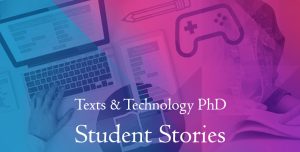
In this series, “T&T Student Stories,” current students share what brought them to the interdisciplinary Texts & Technology PhD program. Interested in learning more? Join us for an upcoming info session virtually or in-person on November 7th!
There wasn’t a time that I lived without the Internet. I’m a “late millennial,” so I grew up with dial-up, but had a smartphone by the time I was 14. I spent my childhood playing video games, visiting chat rooms, and writing fan fiction on Fiction Alley. I made Internet friends, the kinds your parents told you not to make because “anyone could be a dog on the Internet,” but never fully realized the impact that these communities had on my life— until now.
I chose the Texts & Technology program at UCF because of its interdisciplinary views. I completed an undergraduate degree in education and my Master’s in English, and for my Master’s thesis, found myself returning to those online fan communities from my youth. My research focused on the relationship between fan fiction and the classroom, and completed a digital humanities-like project. I was stuck between the English department, where I did not fit into their normal thesis bubble, and the Communication department, where my close reading techniques and textual analysis were not a part of the curriculum. When it came time to apply to doctoral programs, I found it increasingly hard to limit myself to the “traditional” English or Communication department. T&T was recommended by a thesis committee member and the more I looked into the program, the more that I knew it was the right place for me.
I chose the Digital Humanities track in T&T department because my research combines textual analysis on fan fiction comments and the text itself with computational methods like topic modeling. As a first year, I am currently in introduction courses getting a sense of the Digital Humanities field and how I can place myself and my research into it. Fan studies has always been amenable to digital humanities, but with the help of Dr. Anastasia Salter, T&T director, and my advisor, Dr. Mel Stanfill, I am expanding upon this relationship with new research at the intersection of fan studies and ability.
The T&T program has a wide array of students with different backgrounds: some of us study fans and games, while others focus on social media, digital history, archival work, and even medieval Russian literature. The thing that links us all is our work with technology (and also our DnD campaign), as we strive to understand, question, and preserve the very technology we all have used throughout our lives and will continue to use in the future.